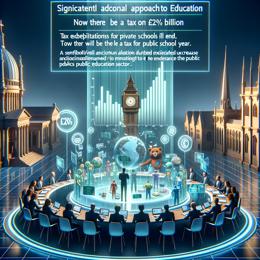Image created by AI
Tensions Rise as South Africa Awaits Ramaphosa's Decision on BELA Act Amidst Political Standoff
The Basic Education Laws Amendment (BELA) Act, signed into law by President Cyril Ramaphosa in September, finds itself at the heart of a fervent national debate. As the three-month consultation period concluded on Friday, 13 December 2024, the South African political landscape bristles with tension and anticipation.
At the core of the controversy are clauses 4 and 5 of the Act, which would shift control of language and admissions policies in schools from School Governing Bodies (SGBs) to provincial education departments. Proponents argue that these changes are vital to ensuring no child is discriminated against based on language, thereby promoting inclusivity and addressing historical educational inequalities.
However, this legislative shift has encountered fierce opposition. Groups like AfriForum and Solidarity argue that the Act targets Afrikaans-medium schools and could dilute parental rights and cultural heritage. Their protests have seen significant turnouts, underscoring the contentious nature of the changes proposed.
The Democratic Alliance (DA), asserting its stronghold over the Basic Education Ministry, has voiced unequivocal opposition to the BELA Act. DA spokesperson Karabo Khakhau emphasized their readiness to challenge the Act's constitutionality in court, should it undermine linguistic diversity and local governance in education.
In contrast, the South African Democratic Teachers Union (SADTU) and other ANC allies are pushing for the full implementation of the BELA Act, viewing it as a crucial step towards transformative justice in education. They have even threatened strikes and legal action if the implementation stalls.
President Ramaphosa, therefore, stands at a crossroads. Implementing the Act in full might alienate the DA and its allies, potentially destabilizing the fragile Government of National Unity (GNU). Conversely, retreating from full implementation could frustrate the EFF, SADTU, and other left-leaning factions, possibly leading to public unrest.
As the nation holds its breath, the President's upcoming decision will not just shape the educational landscape but could also have significant implications for South Africa's political stability. If the BELA Act is implemented fully and effectively, it could mark a significant stride towards inclusivity. However, poor execution or failure to address the concerns of all stakeholders could exacerbate existing divisions, leaving lasting scars on the nation's educational and political fabric.





